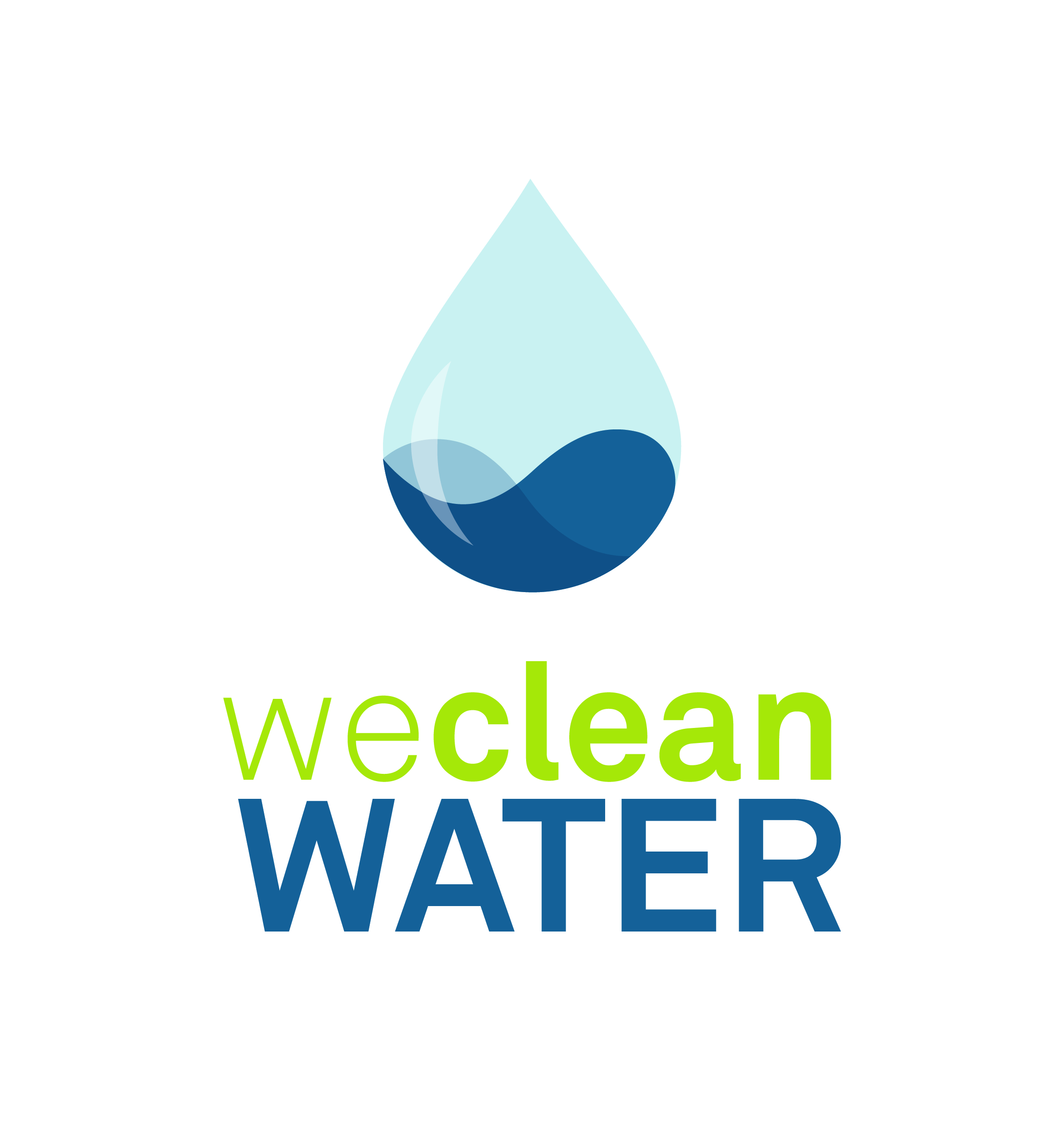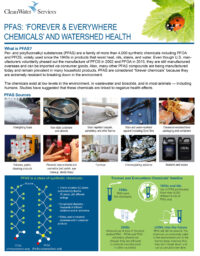Pollution Prevention
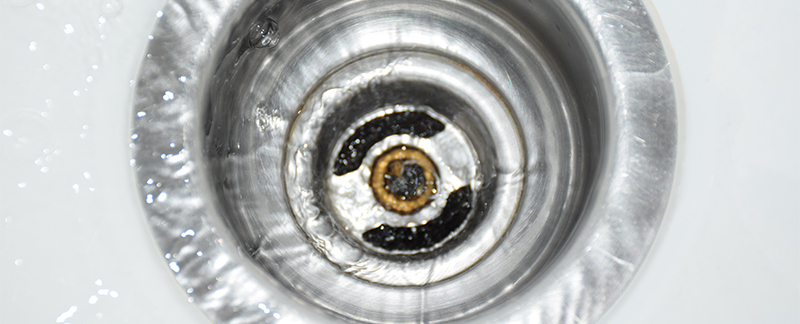
Everyone has a role in keeping our local waterways and the environment healthy. Whenever possible, individuals, and organizations should use practices that reduce or eliminate wastes – at the source.
 Fats, oils, and grease (FOG) from food build up in wastewater pipes when rinsed down kitchen drains. FOG sticks to the insides of wastewater pipes that connect your home or business to the local and regional wastewater system. Built up FOG can clog pipes and cause problems such as costly repair and cleanup at your expense, wastewater backing up into your home or your neighbor’s home, or wastewater overflowing into neighborhood parks, yards, and streets.
Fats, oils, and grease (FOG) from food build up in wastewater pipes when rinsed down kitchen drains. FOG sticks to the insides of wastewater pipes that connect your home or business to the local and regional wastewater system. Built up FOG can clog pipes and cause problems such as costly repair and cleanup at your expense, wastewater backing up into your home or your neighbor’s home, or wastewater overflowing into neighborhood parks, yards, and streets.
Here are examples of each type of FOG:
Fats – Butter, margarine, shortening, peanut butter, meat trimmings, cheese, milk, sour cream, and ice cream
Oils – Cooking oils and salad dressings
Grease – Gravy, mayonnaise, fat from meats, lard, sauces, and soups
DO:
- Scrape food scraps into the trash.
- Pour grease into metal cans, let it harden, and throw in the trash.
- Stop using your garbage disposal, or try to minimize its use.
- Wipe pots, pans and dishes with a paper towel before washing them.
DON’T: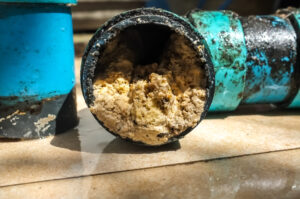
- Don’t pour grease down the sink or toilet.
- Don’t use cloth towels or rags to scrape oil or grease off plates and utensils because grease will drain to the wastewater system when you wash the towels.
- Don’t run water over dishes, pans, fryers or griddles to wash oil and grease down the drain.
The image to the right is what wastewater pipes with built-up FOG can look like.
The MWMC offers fats, oils, and grease disposal kits to community members for free, to make canning your FOG and disposing of it properly easier than ever. Eugene-Springfield residents can complete the form below, to be mailed their very own FOG kit.
By submitting this form, you are consenting to receive marketing emails from: Metropolitan Wastewater Management Commission, 225 Fifth Street, Springfield, OR, 97477, US.
Wipes clog pipes! That’s why it’s important to only flush the tree Ps: pee, poop, and toilet paper. The flushing of other paper and plastic trash causes clogs in wastewater pipes and pumps, as well as damage to equipment at wastewater treatment plants. Additionally, accumulation of wipes in pipes can lead to backup of wastewater into homes and public spaces, creating a public health hazard and environmental damage.
The items listed below should be put in your garbage can or dumpster:
- paper towels
- dental floss
- feminine hygiene products and applicators
- cat litter
- cigarettes
- plastics
- disposable diapers and wipes
Starting July 2022, product packaging for baby wipes, makeup wipes, cleaning wipes, and other personal care wipes sold in Oregon must clearly indicate that such products should not be flushed down toilets. This comes after Gov. Kate Brown signed HB 2344 into law on June 8, 2021, making Oregon only the second U.S. state to require “Do Not Flush” labeling on disposable wipes. The MWMC supported HB 2344 and is glad that it is now law. The MWMC sent a letter of support to Oregon House District 11 Representative Marty Wilde, as well as provided testimony on several occasions.
Community Kiosk Drop-Off Sites & Mail-In Options

Have unwanted or expired prescription drugs around the house? Drop them off at a local community kiosk drop-off site. Below are the guidelines for items accepted and not accepted, as well as a list of community kiosk drop-off sites in the Eugene-Springfield area.
ACCEPTED: Medications in any dosage form, except for those identified as Not Accepted, in their original container or sealed bag.
NOT ACCEPTED: Herbal remedies, vitamins, supplements, other personal care products, medical devices, batteries, mercury-containing thermometers, sharps, illicit drugs, pet pesticide products, animal medicines, and biologics.
Community Kiosk Drop-Off Sites:
Springfield
- Rite Aid, 2130 Marcola Rd.
- CVS Pharmacy, 2750 Gateway St.
- Safeway Pharmacy, 1891 Pioneer Pkwy.
- Sav-On Pharmacy (inside Albertsons)
- 2000 Marcola Rd.
- 5755 Main St.
Eugene
- Kaiser Eugene Chase Gardens Pharmacy, 360 S. Garden Way
- Hirons Drug
- 1950 Franklin Blvd.
- 185 E. 18th Ave.
- Rite Aid
- 1560 Coburg Rd.
- 57 W. 29th Ave.
- 1970 Echo Hollow Rd.
- Genoa Healthcare, 2145 Centennial Plaza Ste. P1
- Willamette Valley Cancer Center Pharmacy, 520 Country Club Rd.
- CVS Pharmacy, 4575 W. 11th
- Sav-On Pharmacy (inside Albertsons)
- 311 Coburg Rd.
- 3075 Hilyard St.
- 1675 W. 18th Ave.
- 55 Division Ave.
- 4740 Royal Ave.
- Safeway Pharmacy
- 1500 Coburg Rd.
- 145 E. 18th Ave.
- 350 E. 40th Ave.
Junction City
- Junction City Police Department, 672 Greenwood St.
- Safeway Pharmacy, 1755 Ivy St.
Cottage Grove
- Cottage Grove Police Department, 400 E. Main St.
- Safeway Pharmacy, 1500 E. Main St.
Community members can also pick up a postage paid, pre-addressed envelope from the locations listed below if preferred, or order free mail-back supplies to be sent directly to them at medtakebackoregon.org.
Medicine Mail-Back Distribution Sites:
Springfield
- Springfield Public Library, 225 5th St.
Eugene
- Kaiser Eugene Chase Gardens Pharmacy, 360 S. Garden Way
Coburg
- Coburg Rural Fire District, 91232 N.Coburg Rd.
Creswell
- Creswell Library, 64 W. Oregon Ave.
- Creswell City Hall, 13 S. 1st
Lowell
- Lowell City Hall, 107 E. 3rd
Veneta
- Veneta City Hall, 88184 8th
- Bi-Mart Pharmacy, 25126 Jeans Rd.
Cottage Grove
- Cottage Grove Community Center & Public Library, 700 E. Gibbs Ave.
For more details such as operating hours for all of the above locations, and to search for the closest location by zip code, visit medtakebackoregon.org.
Lane County Sheriff’s Office Prescription Drug Drop Box
In addition to the above options, the Lane County Sheriff’s Office continues to accept prescriptions from 9 a.m. to 5 p.m., Monday through Friday, in their Prescription Drug Drop Box at 125 E. 8th Avenue in Eugene. The guidelines for what items are accepted and not accepted are slightly different at this location than those listed above.
ACCEPTED: Prescription medications, over-the counter-medications, vitamins, drug samples, pet medications, ointments, lotions, liquid medications in glass or leak proof containers
NOT ACCEPTED: Loose pills (pills must be in a closed container or sealed bag), needles, thermometers, bloody or infectious waste, medications from businesses, hydrogen peroxide, aerosol cans, inhalers
Learn more about Lane County’s Prescription Drug Drop Box on their website.
Why dispose of prescriptions through a community kiosk?
- Reduce prescription drug abuse, especially among kids and teens. More teens abuse prescription drugs than cocaine, heroin, or methamphetamine combined. Teens say prescription drugs are widely available from a variety of sources, including their home medicine cabinets, and those of friends and relatives.
- Avoid the accidental consumption of drugs by pets and children. The Drug Take Back box is an easy way to keep medications away from kids and pets.
- Keep our waterways clean! The Oregon Department of Environmental Quality sampling has found trace amounts of pharmaceuticals in some Oregon streams and rivers, and even groundwater. Do NOT flush unwanted medications down the toilet. This leads to the wastewater treatment plant, and eventually, our waterways.
- motor oil and auto fluids
- pesticides, fertilizers, and lawn care products
- beauty products
- medications (prescription and over-the-counter)
- paint, varnish, paint remover
- photographic chemicals
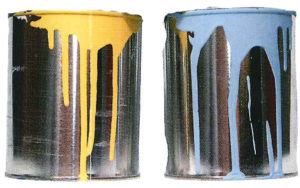
Pollution Prevention Video
Check out our Pollution Prevention video to learn more about the everyday actions you can take to help us keep our local waterways and the environment healthy.
Doing our part for PFAS
Here’s what you can do about PFAS:
- Learn about PFAS. Check out the fact sheet (above) and videos (below).
- Voice your support for removing PFAS from manufactured goods, whether that’s contacting legislators, talking with friends, or voting with your dollars.
- For questions about PFAS at the metropolitan (regional) level and in treated wastewater or biosolids, contact the Wastewater Division at 541-682-8600 or email webweaver.ww@ci.eugene.or.us.
- For questions about PFAS and Industrial Pretreatment, contact the staff in your city. The cities of Eugene and Springfield have separate programs, though they work in partnership:
- For Eugene’s Industrial Source Control phone the Wastewater Division at 541.682.8600 or email webweaver.ww@ci.eugene.or.us.
- For Springfield’s Industrial Pretreatment phone the Environmental Services desk at 541.726.3694 or email dpw@springfield-or.gov.
